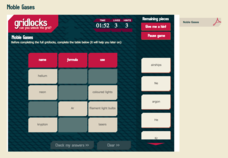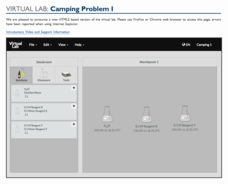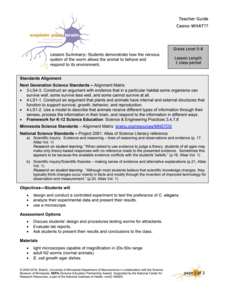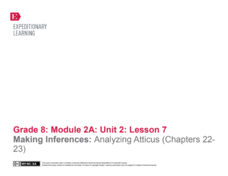Cornell University
Exploring Rocks and Minerals
Investigate the properties of rocks and minerals through a rockin' hands-on activity. Learners test rocks for various properties and, using a guide, attempt to identify different samples. They use various properties including hardness,...
Fluence Learning
Writing About Informational Text: The Dred Scott Decision
Looking for a performance assessment that asks individuals to demonstrate their competency in writing about informational text? Use Frederick Douglass' essay "On the Dred Scott Decision," and an excerpt from Abraham Lincoln's 1857 speech...
Concord Consortium
Seeing Intermolecular Attractions
Ahh, the rules of attraction...intermolecular attraction! Introduce your chemistry crew to the other forces that influence the behavior of atoms and molecules alike with a simple interactive. Pupils push and pull polar and non-polar...
Curated OER
Open Inquiry Using C. elegans
Ever wondered what motivates a roundworm? Introduce your biology class to C. elegans, a non-parasitic model organism that can help them understand behavioral stimuli. Paired pupils design an experiment to test the worm's reaction to...
Royal Society of Chemistry
Oxide Types
Amphoteric compounds act as both an acid and a base. Scholars apply their knowledge of the four oxide types while completing four puzzles. They match a sample of each type of oxide with the corresponding reaction.
Royal Society of Chemistry
Noble Gases
It is best to avoid jokes about noble gases; they get no reaction. Scholars match the noble gases to their symbols and uses. Then they solve three gridlock puzzles reviewing the material while applying some simple logic.
Royal Society of Chemistry
Born-Haber Cycle: NaCl
Max Born and Fritz Haber developed the Born-Haber cycle in 1916, which is used for measuring enthalpy that otherwise couldn't be measured. Young scientists solve four matching puzzles using their knowledge of the stages, standard...
Chemistry Collective
Virtual Lab: Strong Acid and Base Problems
Strong acids and bases don't hesitate to dissociate! Your chemistry class won't hesitate calculating pH either, thanks to an engaging simulation. Individuals perform a series of pH determinations on paper, then use the virtual lab to...
Chemistry Collective
Virtual Lab: Textbook Style Limiting Reagents Problem II
Textbook problems with a twist! Young chemists analyze an ionic reaction to identify the limiting reagent. They then make calculations to determine the concentration of unknown solutions. Finally, they put their work to the test and...
Chemistry Collective
Inelastic Collisions
That's the way the ball bounces ... if the bonds cooperate! Young scholars use a simulation experiment to explore the bonds between atoms in bouncing balls. They adjust the bond strength of two balls to compare the reactions after the...
Chemistry Collective
Virtual Lab: Camping Problem I
Hiking chemists have an advantage! Young scholars use a virtual lab to conduct an experiment to create an exothermic reaction. The goal is to create enough heat to warm a meal during a hike in the rain.
Chemistry Collective
Virtual Lab: Camping Problem II
What happens to the enthalpy of a reaction as the concentration of reactants varies? Learners explore this question with a virtual lab activity. They consider five different solutions of the same reactants and monitor the temperature...
Howard Hughes Medical Institute
DNA Profiling Activity
Everyone loves a good mystery ... can your class actually solve one? Partnered pupils take on the role of forensic investigators during a three-part activity focusing on DNA evidence processing. Learners discover the methods used to...
Student Achievement Partners
Eleven
Turning 11 comes with a range of emotions. Explore those emotions by reading the short story "Eleven" by Sandra Cisneros. Readers analyze the main character's reactions to the events of her day. Then, they write an essay describing what...
Howard Hughes Medical Institute
Bacterial Quorum Sensing
The marine bacteria vibrio harveyi helps with DNA repair in humans. Understanding how to manipulate and genetically mutate this bacteria fascinates researchers. Young scientists observe two different mutations, predict the resulting...
Biology Junction
Bioenergetics
Bioenergetics strives to describe how living things gain and transform energy for biological purposes. First, pupils learn about the types of energy before exploring the importance of energy in biological processes. Next, they discover...
Creative Visions Foundation
Creating Your Own Original Interpretation of the UDHR
How can visual aids enhance understanding of a complex topic? With the third of four lessons from the Introduction to the Declaration of Human Rights (UDHR) set, scholars view illustrations online from the book We Are All Born Free and...
West Virginia Department of Education
An Act Worthy of Reward
John Brown is considered by many to be a martyr for abolition and civil rights. The resource covers an important event in West Virginian history, the raid by John Brown, as a standalone that discusses Brown's last words and his reaction...
University of Minnesota
Caeno-WHAT??
Can you feel that? Can you smell that? Since pupils can't ask worms about their sense of smell and touch, they design and complete an experiment to answer these questions. Individuals expose nematodes to different stimuli using their...
Purdue University
Bottle Racers
Bottle up pupils' energy to complete a great resource. Scholars design toy cars out of plastic water bottles. They consider different sources of energy to power the cars, such as rubber bands, balloons, and chemical reactions.
PBS
Extranjeros and Expansion
A three-part lesson gives light to the Unites States expansion from the view of Texans, New Mexicans, and Californians. Through videos and written activities, scholars work collaboratively to research specific individuals and their...
Howard Hughes Medical Institute
Icefish Blood Adaptations: Antifreeze Proteins
Ever wonder how fish survive in freezing cold water—especially Antarctic waters? Some fish have an adaptation that lowers the freezing point of their life fluids. Learners model these adaptations in two lab explorations. The first...
EngageNY
Making Inferences: Analyzing Atticus (Chapters 22- 23)
What's the verdict? Scholars look closely at the reactions of various characters in To Kill A Mockingbird in the aftermath of the verdict. They circulate the room, responding to a variety of probing questions. Pupils finalize their...
PBS
Shifting Perspectives in Toni Morrison's Beloved
An interactive provides readers with an opportunity to record their reactions to Beloved, Toni Morrison's powerful narrative based on the life of Margaret Garner. Prompts ask them to consider how the shifting point of view contributes to...
Other popular searches
- Chemical Reactions
- Chemistry Chemical Reactions
- Types of Chemical Reactions
- Endothermic Reactions
- Combustion Reactions
- Balance Chemical Reactions
- Chemical Reactions of Matter
- Single Replacement Reactions
- Precipitation Reactions
- Balancing Chemical Reactions
- Displacement Reactions
- Nuclear Reactions

























